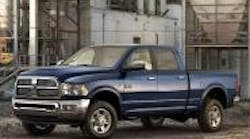“Domestic automakers have made impressive strides in steadily improving vehicle quality, particularly since 2007.” –David Sargent, vice president of global vehicle research, J.D. Power and Associates
It’s a significant achievement by the U.S. automotive industry that needs to be remembered yet also built upon: domestic auto brands, as a whole, demonstrated higher initial quality than import brands according to the 2010 U.S. Initial Quality Study (IQS) put together by J.D. Power and Associates – the first time they’ve ever achieved this distinction over the 24 years J.D. Power has conducted this study, the research firm said.
Overall, the industry average for initial quality is 109 problems per 100 vehicles (PP100) in 2010, increasing slightly from 108 PP100 in 2009. However, initial quality for domestic brands as a whole has improved by four PP100 in 2010 to an average of 108 PP100, J.D. Power’s research indicated – slightly better than the initial quality of import brands, which averages 109 PP100 in 2010.
In particular, substantial improvements by specific domestic models – including Ford Motor Co.’s Focus small car, Chrysler’s Ram 1500 LD pickup and General Motor's Buick Enclave crossover – drove the overall improvement of domestic automakers in 2010. In particular, initial quality of Ford models has improved steadily for the past nine years.
In addition, J.D. Power said Ford, as a corporation (which includes Volvo) has 12 models that rank within the top three in their respective segments in 2010 – more than any other automaker this year – with GM nipping at their heels with 10 models ranking within the top three in their segments.
[One of the ways Ford, for one, hopes to stay in the top quality rankings, while also delivering vehicles with more power and better fuel economy, is via new EcoBoost engine technology. You can see a clip about these new engines below.]
“This year may mark a key turning point for U.S. brands as they continue to fight the battle against lingering negative perceptions of their quality,” said David Sargent, J.D. Power’s vice president of global vehicle research.
Historically, newly launched models have incurred substantially more quality problems than carryover models, on average. However, more than one-half of all models launched during the 2010 model year perform better than their respective segment averages, he said.
“With automakers committing huge budgets for the design, engineering, production and marketing of all-new models and major redesigns, hitting the quality mark out of the gate is critical,” noted Sargent.
“Getting initial quality right on model launches can serve dual purposes for automakers – boosting profitability and also inspiring consumer confidence in the overall quality of their models,” he added. “Having a strong quality image is essential for automakers to be able to compete in today's market – both in the U.S. and around the globe.”
Yet this only the starting point on a long road that needs to be travelled, he stressed, as domestic automotive manufacturers need to consistently prove to consumers that they can produce models with quality that equals or beats that of the import brands.
“Achieving quality comparability is the first half of the battle; convincing consumers – particularly import buyers – that they have done this is the second half,” Sargent pointed out.
[GM plans to keep plugging away at consumer perceptions of its products on a number of fronts, especially in the car segment with new vehicles like the 2011 Chevy Cruze, seen below. Note the focus in this clip on smaller displacement yet more powerful engines as well as extreme durability testing for the Cruze.]
Still, it’s a noteworthy moment for domestic OEMs that have long fallen short of the top quality mark. The Ford brand, for example, moved to fifth place among all brands from eighth last year. This is the highest position Ford has achieved in the IQS since ranking 23rd in 2004, the automaker noted. Its luxury brand, Lincoln, which was 26th on the list in 2009, now sits at eighth.
"Steady and meticulous attention to new model launches along with consistency in how we do them across the brand and the globe are having a very positive effect on the initial quality of our all-new or redesigned products,” said Bennie Fowler, Ford’s group vice president for global quality & new model launches.
Yet a lot of pain and suffering also must be accounted alongside the top quality scores U.S. automakers are now nabbing. Ford, for one, shut down its 70 year-old Mercury brand in early June, which followed the selloff of the Land Rover and Jaguar luxury brands as the company consolidated cash in order to ratchet product engineering and quality up to higher levels.
GM’s been doing the same, going through bankruptcy proceedings last year with the aid of Federal bailout monies, also while shedding former product labels such as Pontiac, Saturn, Saab, and Hummer. It’s been a trying time to say the least for GM, but it’s also managed to still knock a few out of the park, with the redesigned Chevrolet Malibu mid-size sedan still garnering critical praise, along with its redesigned pickups and crossovers (especially the Chevy Traverse).
None of the domestic automakers are out of the woods yet – not by a long shot – but the IQS numbers this year at the very least show they are on the right path, firing on all cylinders.



